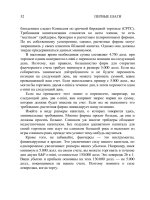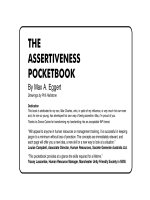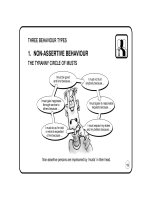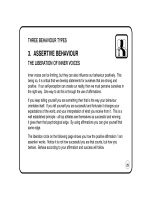THE ASSERTIVENESS POCKET BOOK phần 4 pot
Bạn đang xem bản rút gọn của tài liệu. Xem và tải ngay bản đầy đủ của tài liệu tại đây (99.83 KB, 10 trang )
THREE BEHAVIOUR TYPES
3. ASSERTIVE BEHAVIOUR
THE LIBERATION OF INNER VOICES
Inner voices can be limiting, but they can also influence our behaviour positively. This
being so, it is critical that we develop statements for ourselves that are strong and
positive. If our self-perception can create our reality, then we must perceive ourselves in
the right way. One way to do this is through the use of affirmations.
If you keep telling yourself you are something then that is the way your behaviour
orientates itself. If you tell yourself you are successful and fortunate it changes your
expectations of the world, and your interpretation of what you receive from it. This is a
well established principle - all top athletes see themselves as successful and winning;
it gives them that psychological edge. By using affirmations you can give yourself that
same edge.
The liberation circle on the following page shows you how the positive affirmation ‘I am
assertive’ works. Notice it is not how successful you are that counts, but how you
behave. Behave according to your affirmation and success will follow.
29
POSITIVE AFFIRMATION
'I am assertive'
POSITIVE EXPECTATIONS
'I am persuasive when
necessary'
ASSERTIVE BEHAVIOUR
'I can understand your view
but my position is '
POSITIVE RESULTS
'I have been assertive'
INTERNAL THOUGHTS
AND DIALOGUE
EXTERNAL ACTIONS
AND BEHAVIOUR
THREE BEHAVIOUR TYPES
3. ASSERTIVE BEHAVIOUR
THE LIBERATION CIRCLE
‘The more you do of what you’re doing the more you get of what you’ve got.’
30
THREE BEHAVIOUR TYPES
3. ASSERTIVE BEHAVIOUR
AFFIRMATIONS
Using affirmations is one way to improve our inner voices.
An affirmation is a personal statement which encapsulates beliefs about ourselves that
we hold dear. Affirmations can be positive or negative. Obviously, positive affirmations
are better for our mental well-being.
Positive affirmations help you:
● Cast off the limitations of other people’s beliefs that you inherited during childhood
● Become your own person so you can stand alone and be strong
● Gain self-confidence
On the following page are some examples of affirmations, but give some thought to
developing your own. Take time to read them regularly, especially first thing in the
morning and last thing at night.
31
THREE BEHAVIOUR TYPES
3. ASSERTIVE BEHAVIOUR
AFFIRMATIONS FOR WORK
● I am a competent and confident person
● I always learn from my mistakes and those of others
● I am an attractive and interesting person
● People listen to what I have to say
● At meetings I make a significant contribution
● I am persuasive and influential
● I am responsible for myself and my actions
● I am independent of the approval of others
● I can always find opportunities in situations of change
● I am creating my desired future
Some of these affirmations may appeal, others may not. What is important is that you
develop a set for yourself.
32
THREE BEHAVIOUR TYPES
3. ASSERTIVE BEHAVIOUR
AFFIRMATIONS FOR LIFE
● I am what I am
● I have all the resources to do what I want to do
● I am at one with myself and my world
● I am free to be what I want to be
● I respect myself and all living things
● In being myself I express the godhead within me
● In loving myself I love others
● I am continually developing
towards my inner self
● All things have meaning
and there is always
opportunity in adversity
● In giving I achieve more
● I am open to the opportunities
this day brings
33
34
RIGHTS & RESPONSIBILITIES
35
RIGHTS & RESPONSIBILITIES
BASIC RIGHTS
DEFINITION
Recognition that individuals living in a free society should enjoy entitlements which
encourage them to behave in ways that empower them psychologically to become fully
functional, to the benefit of themselves and society at large.
This means that you can:
● Behave according to your rights without needing permission or approval from others
● Expect to use these rights without being asked to justify your behaviour
● Encourage others to use these rights for themselves
● Expect society to support you in the exercise of these rights
If you do not exercise your rights you will:
● Damage yourself psychologically
● Increase your levels of stress and anxiety
● Receive less than your fair share of those things you value
● Corrode and damage relationships with others
When you are responsibly assertive, you become your true self and encourage others to
do the same.
36
RIGHTS & RESPONSIBILITIES
BASIC ASSERTIVE RIGHTS
Every human has the right to:
● Be treated with respect
● Express opinions and feelings
● Set goals and objectives
● Refuse a request or say ‘NO’
● Ask for what they want
● Make mistakes
● Be the judge of their own behaviour
independent of the goodwill of others
● Get what they pay for
● Change their mind
● Decide whether or not to assert
themselves
37
RIGHTS & RESPONSIBILITIES
BASIC ASSERTIVE RIGHTS
To be treated with respect
● You have the right to live your life as you wish and pursue your own goals and
objectives, providing you do no harm to others
● You have the right to be treated politely and courteously by others, irrespective
of their position; dignity and respect are prerequisites of a civilised and
democratic society
To express your opinions and feelings
● You have the right to express yourself
● Your view of situations and how you feel about them is as valuable as anyone else’s
● If you wish to make your position or your emotions public then you have the right to
do so; it is you not anyone else who decides whether or not you should
If we withhold our feelings and opinions others will not have the opportunity to know or
understand us. Thus we will be denied the value and beauty of true friendship.
38









